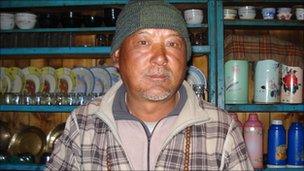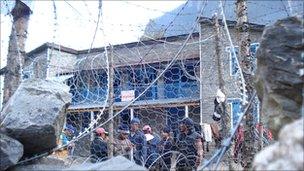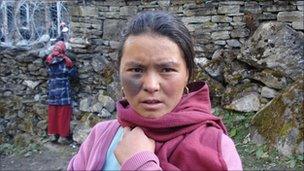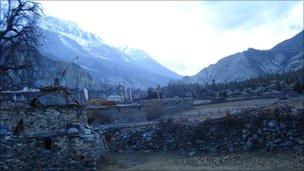Yarsagumba: Curse of Himalayan Annapurna region
- Published
Joanna Jolly handles some yarsagumba
The Himalayan mountain range that straddles the border between Nepal and Tibet is known as one of the most beautiful and remote places in the world.
Every year, thousands of tourists come here to trek on the Annapurna circuit which takes them high into the snowy mountains to climb passes over 5,000m (16404ft).
This isolated and barren landscape is home to Buddhist communities who have lived, farmed and traded here for centuries.
But in the last few years, this peaceful region has been rocked by jealousy, crime and murder.
All this is down to Yarsagumba, the small, fragile, mummified body of the Himalayan bat moth caterpillar that has been invaded by a fungus - and which is famous throughout the Himalayas as a powerful medicine.
'A sin'
As the freezing night falls in the Himalayan village of Humde, Sangay Gurung and his wife huddle around their fireside, preparing a supper of rice and vegetables.
Sangay tells me he can sell me some Yarsagumba.

Sangay Gurung believes it's a sin to trade in Yarsagumba
He has some of this precious substance because his son has collected it. But he is not happy handling it.
"We believe it's a sin to trade in Yarsagumba," he says.
"In our Buddhist culture we're not supposed to pick it - that's our tradition.
"My grandparents told me this and I obeyed them. I'm 53 now and I've never picked it. But the young generation is different. They don't believe in sin or religion so they're making money from it."
For the past 500 years, Yarsagumba (Cordyceps sinensis), has been prized as an aphrodisiac by the Chinese.
It can be found in the high pastures of the Himalayas above 3,500m, and is traditionally picked in early spring before the monsoon rains.
'Great aphrodisiac'
Each year, hundreds of Tibetan traders cross the border illegally into Nepal to buy Yarsagumba from local villagers and sell it back to China. One kilogram can fetch up to $10,000.

Three dozen villagers are being kept in a makeshift prison in Chame village
"The medical properties of Yarsagumba are numerous and many," says Carroll Dunham, a medical anthropologist who has worked in Nepal for the past 25 years.
"Yarsagumba is known as an immune booster. It's also known as a great aphrodisiac.
"It works in a way similar to Viagra. It's considered to be helpful for impotence in men and it's considered to be a great stimulant."
This has meant that Yarsagumba has become the most valuable commodity in this remote region that has few economic opportunities.
It has become so lucrative that the district government now operates a permit system for those who want to collect Yarsagumba.
In certain areas, the permits are more expensive for people from outside the region. In others, outsiders are completely banned from searching for the drug.
Turf war
For some mountain villagers, the chance to collect Yarsagumba has brought great wealth. But for others, it has brought great misery.

Samma Tsering says her brother is innocent
In June 2009, seven men from the low-lying Gorkha region of Nepal who came to the mountains to pick Yarsagumba were murdered by a local mob protecting their turf.
The men were attacked with sticks and knives and their bodies thrown into deep mountain ravines.
Nal Prasad Upadhay was the police officer in charge of the investigation.
"It was a very big operation. More than 80 police personnel were mobilised in that case," he says.
"Two bodies were collected from a very difficult place - the police had to use ropes to recover them. We couldn't find the other five bodies."
Thirty-six men from the remote village of Nar were arrested for the crime and are still waiting for a verdict.
Barren
There isn't a prison big enough to hold them in the mountain region, so they are being kept in a converted district education office in the village of Chame.

Yarsagumba is found in these beautiful and remote mountains
In the last few months, 17 men were let out on bail. The rest spend their time behind barbed wire, playing cards and basketball, and depend on their relatives to bring them food.
"I think my brother will be freed very soon," says Samma Tsering, who visits the prison daily.
"Whenever I meet him, he says that he hasn't done anything wrong."
Since her brother was arrested, Samma's life has become focused on supporting him.
Because most of the men from her village are in this jail, there is no one left behind to work.
"Our land is barren now," she says.
"There is no one to plough the fields so we haven't been able to grow anything for two years. Women who know how to do the men's work are somehow managing but most of them can't."
A verdict in the case of the Yarsagumba murders is expected in February.
From March, the Yarsagumba picking season will start again and hundreds of locals will scour the mountainsides searching for the valuable drug in the hope that they will make their fortune.
But for many who live here, Yarsagumba is not a blessing but a curse. And they remember the old Buddhist saying that it will bring nothing but bad luck.